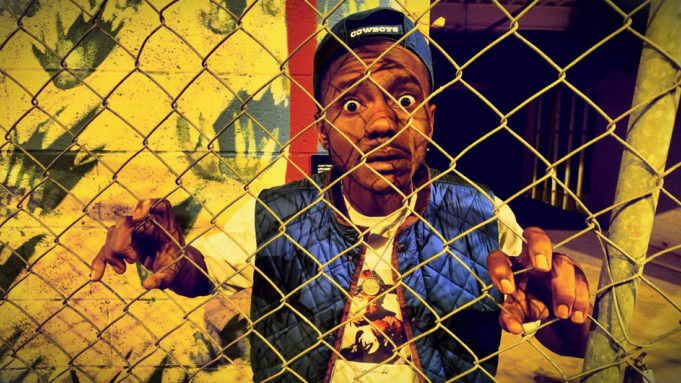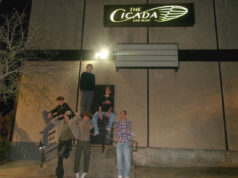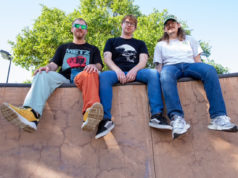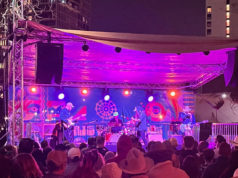Every town has its nicknames. Chicago is lovingly referred to as Chi-Town or the Windy City. NYC is, of course, the Big Apple. Similarly, Dallas (surely in no way overcompensating) is known as Big D. As a fast-growing city on the verge of cracking a million residents, Fort Worth certainly has its share. With its association to the historic Stockyards, it has long been called Cowtown. Another name, this one seemingly skyrocketing in popularity in recent years — frankly, because it’s pretty badass — is Panther City.
With his new album, rapper Solar Slim is trying to remind folks of another classic F-Dub sobriquet. This one, an homage to the city’s rich and varied musical history, owing to the experimental saxophone work of Ornette Coleman and the muddy blues of Delbert McClinton; the legacy of J&J’s Blues Bar, the Bluebird Club, and the Scat Jazz Lounge; and the days when the legendary George Clinton would land the Parliament Funkadelic Mothership in the middle of downtown at the Convention Center and people from all over the state would come to see the performance. That name? Funkytown. Released this week, Funk Town serves to honor, and to add itself to, the city’s rich and decidedly funky history.
The rapper said the inspiration behind his sophomore effort, his first new work in five years, was the often-violent subculture he sees among some of the city’s youth, including an incident in his grandmother’s neighborhood that saw her home riddled with more than a dozen errant bullets, a terrifying result of gang-related activity. Such violence has earned the town another, less complimentary nickname among the streets: “Fort Murder Worth.” Slim is hoping his album serving as a reminder of the town’s laudable cultural legacy will reignite a pride in everyone’s hometown and a willingness to protect and improve it.
“Seeing our city turn into one that’s glorified for violence and murder makes the hair on the back of my neck stand up,” Slim said. “It’s not something I can really get down with. I’m trying to give another perspective. I’m trying to offer an alternative version of Fort Worth. It’s actually not an alternate Fort Worth. It’s the Fort Worth you’re living in right now. You just can’t see it because you’re focused on this other thing.”
Like his debut, 2019’s Vice City, Slim produced the album himself, crafting beats built around samples from familiar songs that feature the word “funk.” Like Lipps Inc.’s “Funkytown,” DJ Casper’s “Cha Cha Slide,” and George Clinton’s “We Want the Funk.” Over the course of the record’s 17 tracks, Slim, along with his nephew and fellow rapper Martale, take the listener on a tour through the album’s namesake city stacked with local references to things like the Water Gardens, the Stockyards, and the Trinity River. Several other notable Fort Worth rappers take verses as well: Neo Sohl, J/O/E, and David Allen Dope to name a few.
Solar Slim’s wise, macro-level worldview is likely owed to his unique position in the world of hip-hop. His day-to-day is certainly not what one might expect from your average rapper. In music, he’s best known as a producer, providing his signature, classic, sample-based beats for the likes of Superstar and Def Jam’s Bone tha Mack, in addition to his own music. In his daily life, however, he’s known as Jeremy Brown, a card-carrying PGA member golf pro at a local country club. Slim said he owes his profession — in which he admits is “a world where I’m a bit of a unicorn” — to his father, who put a golf club in his hand as a kid. Slim was a varsity golfer throughout high school, even earning a college scholarship from the sport.
“It’s an interesting position to be in,” Slim said of his ability to move between these two seemingly disparate worlds. “I know people who are deep in the streets. Maybe they’ve been in the streets their whole life and then decided to turn things around, or I know other people who crashed and went to prison for the rest of their life. I also know people who run billion-dollar companies and have gained affluent positions in life. And I see all these different people within the same 24 hours.”
It would be easy for someone in his position to perhaps feel unwelcome in either of these facets, scoffed at by his neighborhood peers for being “a golf nerd” or maybe looked at sideways by the white-collar world for being a rapper and the preconceived notions that might come along with that. But, indicative of his inherently wise perspective, he said he came to realize most of that discomfort was mostly in his head.
“What I really had to realize was that it was just me accepting myself,” he said. “All the questions I had in my head, going all the way back to feeling lame when I was playing golf in high school or me feeling like maybe the people who I rub elbows with in the golf industry aren’t going to like the music that I put out, that it might be a bad image for the PGA or stuff like that. But me being myself has always propelled me way further than me trying to suppress who I really am.”
It’s that kind of thoughtfulness that informs the insight in the tracks on Funk Town. Compiling the stories and histories he uncovers across the album was a big undertaking, Slim said. It took a lot of research, but it also gave him a newfound appreciation for his home. It was a project that took a lot of effort but was driven by a lot of passion.
“This has been a tremendous journey in learning about Fort Worth and learning about what a great place it’s been for decades,” he said. “Learning about these people, these places, this music — it’s about learning and connecting with who you are and where you come from. I’m trying to paint a very specific picture but also for each person to take whatever pieces they can from it and apply it to their own journey.”












